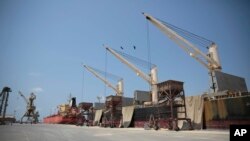The World Food Program warns that millions of people throughout Yemen who depend on the commercial import of food into the country will go hungry because of fighting around the port of Hodeida.
Fighting around Yemen's vital port city of Hodeida has intensified since mid-November when the Saudi-led coalition launched airstrikes against Houthi rebels.The vicious tit-for-tat combat has resulted in a sharp decrease in port operations by nearly half as shipping companies appear reluctant to put themselves at risk.
About 70 percent of the country's food and other essential goods are imported through the port of Hodeida.The World Food Program warns millions of people throughout the country depend upon the commercial import of food to feed their families.
WFP spokesman, Herve Verhoosel, says around 20 million people do not receive food assistance from international organizations like his own.He says they purchase their food on the market and depend upon the arrival of commercial ships.
"If this situation persists or further deteriorates, it will have a drastic impact on food availability and prices in the market and make it increasingly difficult for Yemeni families to afford their basic needs," ssaid Verhoosel. "The food today is already very, very expensive on the market because there is not a lot of food…and if less boats arrive, that price will increase even more."
Verhoosel says there is enough commercial food stock in Yemen for 2.5 months.
He notes the port of Hodeida is a vital lifeline for humanitarian, as well as commercial deliveries.He says disruptions to the port's operations could hamper international efforts to prevent famine.
The U.N. calls Yemen the worst humanitarian crisis in the world and warns more than three years of warfare has put some 14 million people on the brink of famine.
The World Food Program feeds eight million people a month.Verhoosel says WFP has enough food stock in the country for the next two months.He says WFP is in the process of importing more food through Aden and the Salalah Port in Oman to make sure its food pipeline into Yemen continues without interruption.






